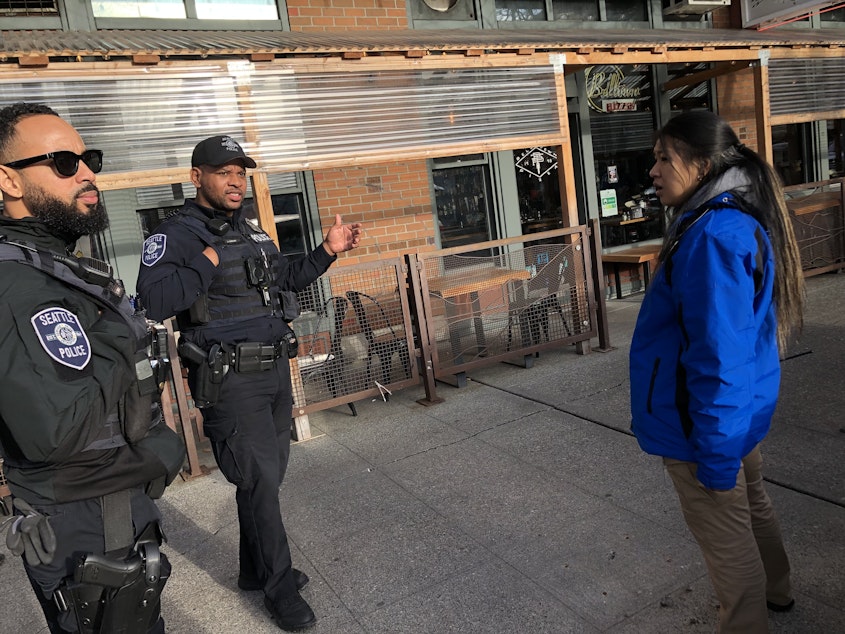New mental health teams are hitting the streets in downtown Seattle alongside police

Armed with snacks and blankets, Seattle’s newest first responders are hitting the streets. Through a pilot program launched last fall, the city’s 911 dispatchers are now directing a team of mental health professionals to certain calls alongside police officers.
Sasha Pollock is one of the community crisis responders for the city’s new CARE (Community Assisted Response and Engagement) department. On this winter day she and her partner are joining police officers to check on a young woman who has been sitting on the sidewalk for hours in the Belltown neighborhood. Dispatchers say the woman appears high or intoxicated.
When they arrive, Pollock and her partner speak with the two police officers who got there first, and then approach the woman, who asks for directions but declines further help. An employee at a nearby business tells them he called 911 because he was concerned for her.
It’s a fairly typical call for CARE teams now active in Seattle’s downtown core.
Pollock says so far she loves her new job.
Sponsored
“I like the calls we’ve been responding to, getting to support and provide those resources for people in immediate need,” she said.
So far, dispatchers and police have requested the CARE team for people on the street who need supplies, referrals to resources, transport or just someone to listen. The teams do not respond if there’s any threat of weapons, or a need for higher levels of medical care, as with a drug overdose.
Pollock said she and her partner recently responded to the scene of a car crash, to help the two teenagers involved.
“They were from out of town, down near Vancouver, and they had nowhere to go because they had crashed their vehicle,” she said.
Her partner Chris Inaba said the teams’ evening hours are often their busiest.
Sponsored
The night before, police requested Inaba’s help at Second Avenue and Pine Street. Temperatures were dropping and most shelters were already full.
“We spoke with officers, they let us know they were flagged down by an individual who was looking to get into shelter,” Inaba said. “We contacted our resources, and we were able to find the person a bed, and then we provided the transport as well.”
CARE team members are unarmed and don’t do any enforcement, just voluntary assistance. The unit is small, there's a single team available from 11am to 11pm each day and their response area is confined to the downtown core.
Inaba said he hasn’t had any safety concerns, thanks in part to his training and the call screening by 911 dispatchers. And police are almost always first on the scene before his team shows up.
“The SPD officers have been great to make sure that the scene is safe, that we feel safe," Inaba said. "They will always communicate, ‘Are you okay if we leave?’”
Sponsored
The CARE department provided KUOW with survey results completed by their community crisis responders for 156 calls. The results suggest that in the majority of cases – 102 – police officers have “arrived on scene first and handed off” to the CARE team, which allowed the officers to proceed to other calls. In a smaller subset, 42 calls, officers remained on the scene during the entire CARE team interaction.
In a handful of cases, the CARE team arrived on a scene “prior to SPD,” and in three cases police officers cleared the scene but were ultimately called back by the CARE team. Inaba said he feels comfortable knowing he can request that police return if necessary.
In a statement, SPD Deputy Chief Eric Barden said, “While there isn’t sufficient data to determine outcomes, officers have anecdotally been very pleased with the contribution Care Team members have provided. I am frequently hearing West Precinct officers proactively calling for Care Team support over radio. This is in addition to the calls Care and Patrol respond to in a Dual Dispatch capacity. “
“Dual dispatch” indicates that both police and the CARE team were assigned to a call by 911 dispatchers, as opposed to police officers subsequently requesting the team.
The CARE teams are Seattle’s first expansion of 911 dispatch, beyond police, fire, and medical responders, but maybe not the last.
Sponsored
Amy Smith is the CARE department’s acting chief. She has oversight of 911 dispatch as well as the new mental health responders. Smith said she views 911 as a potential clearinghouse to dispatch other responders as well, like the police department’s community service officers, who are also unarmed and perform community outreach.
“We don’t dispatch them — why not? I can do that, that’s a simple protocol, it’s easy to change in 911,” she said.
But while these different teams can refer people to services, they can’t provide longer-term assistance. Smith says her goal in 2024 is to try to find more lasting solutions for people in crisis in Seattle.


